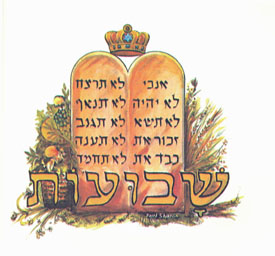

January 4, 2026 ~ Sh SHEMOT. Maqam RAST / BAYAT.

Introduction by Sam Catton
The Bringing of the First Fruits to the Temple
The Giving of the
Torah at Sinai
This festival occurs forty-nine days after the exodus from Egypt. The positive commandments of this holiday are to bring the first fruits to the Temple in Jerusalem, to rejoice on that day; and to refrain from work.
Since this holiday coincided with the giving of the Law at Sinai, it is permeated with an unusually important content.
Our Sages consider this holiday as an extension of, and as the final day of Passover. All of the above indicates that the bringing of the first fruit can be done only in the Holy Land. Many of the Torah's commandments are contingent on living in the Land of Israel.
The custom of the Sephardic Communities is to stay awake the entire first night, and to recite the Law and the holy Zohar. On the first and second days of this holiday, it is our custom to read the Azharot of Ib'n Gabirol and the Book of Ruth.
We should be extremely joyous in knowing that on this day we were selected from all the nations to become His people. The immortal words of Saadiah Gaon remind us that our people is a nation only by the virtue of our Torah.
Shabuot, the festival of receiving our Torah, is observed on 6 Sivan.
| Section | Pizmon | Page | Song | Commentary | Recordings | Application |
|---|---|---|---|---|---|---|
| Ruth | 3007 | R1 | מגילת רות | Maqam Hoseni.This book is read on Shabuot. Aleppo Codex- Ruth 1 Aleppo Codex- Ruth 2 Aleppo Codex- Ruth 3 Aleppo Codex- Ruth 4 |
G. Shrem Haim Daya- Ruth 1 Recording Max E Tawil- Ruth- Ch 1 Max E Tawil- Ruth- Ch 2 Max E Tawil- Ruth- Ch 3 Max E Tawil- Ruth- Ch 4 Haim Asriqi/ Salem Aisbeda, 1911- Ruth 1:1-3, Qohelet 1:1-5 Mickey Kairey- Ruth Chap 1 |
|
| Azharot | 2351 | A4 | אזהרות |
G. Shrem Yosef Hamaoui - Naqdishakh I Cabasso- Semehim D Binker-Duek - Semehim I CABASSO SEMEHIM |
שמחים | |
| Hoseni | 430.2 | 568b | ויהי בימי שפט השפטים | From Megilat Ruth applied to Mimisrayim (Hoseni). |
G. Shrem G. Shrem- Mimisrayim- Megilat Ruth I CABASSO MIMISRAYIM |
ממצרים |
| Tehillim | 68 | 100 | מזמור סח - מזמור לחג השבועות |
Max E Tawil H Baruch Ben Haim |
למנצח מזמור שיר | |
| Azharot | 2352 | A25 | כתובה למתן תורה | Traditionally read when opening the Torah Ark on the first day of Shabuot. Maqam Hoseni. |
G. Shrem |
|
| Azharot | 391.094 | A2 | אמון יום זה | An introduction to the Azharot by Ribbi David Ben El'azar Baqoudah |
Yosef Hamaoui G. Shrem |
שועת עניים |
| Section | Pizmon | Page | Song | Commentary | Recordings | Application |
|---|---|---|---|---|---|---|
| Baqashot | 32 | 40 | 'אנכי שמי ה |
Archives E. Menaged E. Menaged 2 G. Shrem Recording- Nahwand Recording Recording I CABASSO NISHMAT Beth Torah Baqashot |
אל ההודאות | |
| Ajam | 224 | 177 | ינון שמו |
G. Shrem Yosef Hamaoui I. Cabasso G. Shrem Recording Moshe Dwek Moshe Dwek - SA I CABASSO SHAVAT ANIYIM |
שועת עניים | |
| Ajam | 227 | 179 | רועה נאמן הוא |  |
G. Shrem Fule Yanani I. Cabasso - Qaddish G. Shrem Recording I Cabasso Moshe Dwek Moshe Dwek - Qaddish Moshe Dwek - Qaddish |
כתר |
| Nahwand | 285 | 220 | אהלל ואביע |
I. Cabasso- Halleluyah G. Shrem G. Shrem Moshe Dwek Moshe Dwek - Ahallel VeAbia I CABASSO EL HAHODAOT |
הללויה | |
| Bayat | 333 | 255 | ידידי השכחת | Matan Torah. |
Yosef Hamaoui M Kairey G. Shrem Recording |
קדיש |
| Bayat | 350 | 268 | 'הללו את ה |
Yosef Hamaoui G. Shrem I Cabasso I Cabasso |
||
| Hoseni | 408 | 334 | דודי אתן |  |
G. Shrem E. Menaged G. Shrem Recording Maury Blanco M Blanco- Qaddish |
קדיש |
| Hoseni | 409 | 334 | דעת ומזמה |
Yosef Hamaoui Fule Yanani G. Shrem G. Shrem Recording Recording M Habusha I Cabasso- Qedusha M Kairey D Binker-Duek Moshe Dwek I CABASSO QEDUSHA I CABASSO QEDUSHA |
נקדישך | |
| Hoseni | 411 | 336 | יה אשאל ממך |
I. Cabasso |
||
| Hoseni | 420 | 342 | יחיד ומיוחד |
G Shrem |
כתר | |
| Sigah | 564 | 469 | מי זאת עולה יפה-פיה |
G. Shrem G. Shrem Recording Shabetai Laniado Moshe Dwek Moshe Dwek - HM |
ה' מלך | |
| Hoseni | 423 | 344 | בחר דודי בעמו |
G. Shrem Fule Yanani G. Shrem Recording |
||
| Hoseni | 420.01 | 342a | אלי בא זמן |
Arabic Recording H Obadia Yosef |
||
| 2353 | שמח בני חתן נעים בן פרת יוסף |  Maqam Hoseni Arabic melody: רקץ אל באן. Specifically applied to Nishmat on weeks related to Mattan Torah. Hamaoui Manuscript British Library Or. 10375 Maqam Hoseni Arabic melody: רקץ אל באן. Specifically applied to Nishmat on weeks related to Mattan Torah. Hamaoui Manuscript British Library Or. 10375 |
|
נשמת |